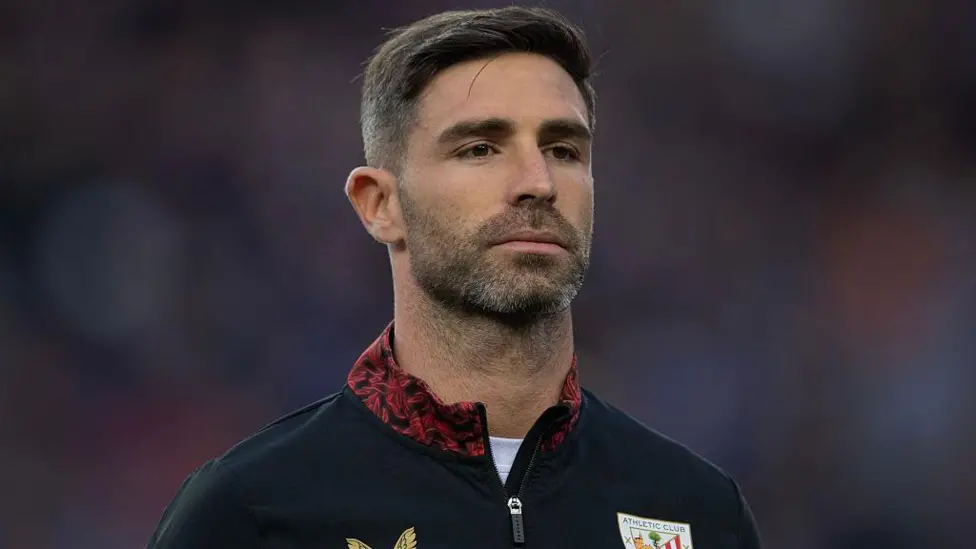Athletic Bilbao defender Yeray Alvarez has been handed a 10-month ban after failing a drugs test, though European football’s governing body accepted that his violation was unintentional.
The 30-year-old tested positive for canrenone — a diuretic sometimes used as a masking agent — following Athletic’s 3-0 defeat by Manchester United in the Europa League semi-finals in May. Uefa confirmed the sanction this week, ruling that Alvarez committed a “non-intentional anti-doping rule violation.”
Alvarez’s case is a particularly sensitive one, given his history of illness. The Spain international was diagnosed with testicular cancer in 2016 and has since been under treatment for side effects, including hair loss. He explained that the banned substance entered his system through a preventative medicine for alopecia, which he had been prescribed as part of his recovery.
Uefa’s disciplinary body accepted Alvarez’s defence and emphasised that there was no evidence of deliberate doping or intent to enhance performance. However, the governing body insisted that athletes remain responsible for any substance that enters their bodies, meaning a ban was unavoidable.
Provisional suspension backdated
Alvarez accepted a provisional suspension in June, which has been backdated. As a result, he will be free to return to training from 2 February 2026 and can resume competitive football from 2 April 2026.
For both the player and Athletic Bilbao, the ruling brings relief that the sanction was not longer, but frustration that such a misstep occurred at all. It also serves as a reminder of the strict liability principle that governs anti-doping regulations: intent is not required for punishment, though it can influence the length of a ban.
Long-serving Bilbao defender
A graduate of Athletic’s famed academy system, Alvarez has made 257 appearances for the Basque club since breaking into the first team in 2016. His resilience and determination in overcoming cancer to continue his career made him a symbol of perseverance for supporters.
The ban, however, halts that journey at a crucial stage. Alvarez has been a regular starter in recent seasons and played a key role in helping Bilbao challenge for European places. His absence for much of the 2025-26 campaign will force manager Ernesto Valverde to reshuffle his defensive options.
A complex case
The use of canrenone in medical treatments complicates Alvarez’s situation. While classified as a diuretic and potential masking agent, it can also be prescribed legitimately for conditions linked to hormonal changes and hair loss. Anti-doping authorities face difficult decisions when such substances appear in athletes’ samples, balancing the need to uphold strict standards with compassion for medical histories.
In Alvarez’s case, Uefa’s panel concluded that the defender had not sought any competitive advantage. Nevertheless, the rules demanded action. The outcome mirrors previous high-profile cases where athletes have received reduced but still significant bans for inadvertent ingestion of banned substances.
Impact on Athletic Bilbao
Bilbao, who have prided themselves on building squads primarily from local Basque talent, will feel the absence of their experienced defender. Alvarez’s leadership and consistency at the back have been vital, particularly in European competition. With the defender sidelined until April, younger squad members may be asked to step into more prominent roles.
For fans, the suspension is bittersweet. Many will sympathise with Alvarez’s circumstances but also recognise the damage such incidents can cause to a club’s reputation.
Looking ahead
When Alvarez returns in 2026, he will be nearing his 31st birthday, with much to prove and perhaps even more to inspire. His journey has already been marked by resilience, and this latest setback may further shape his legacy.
For now, though, his focus will be on training individually, maintaining fitness, and preparing for what he hopes will be a meaningful comeback in the spring.
In the unforgiving world of professional sport, even unintended mistakes carry heavy consequences. Alvarez’s story highlights both the strict standards athletes must meet and the human realities that can complicate those demands.



